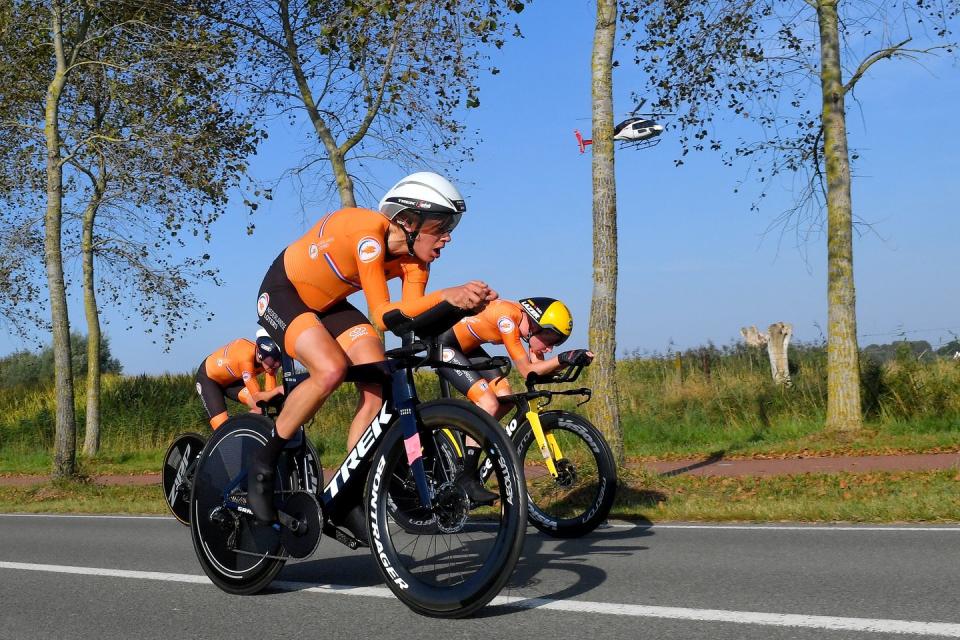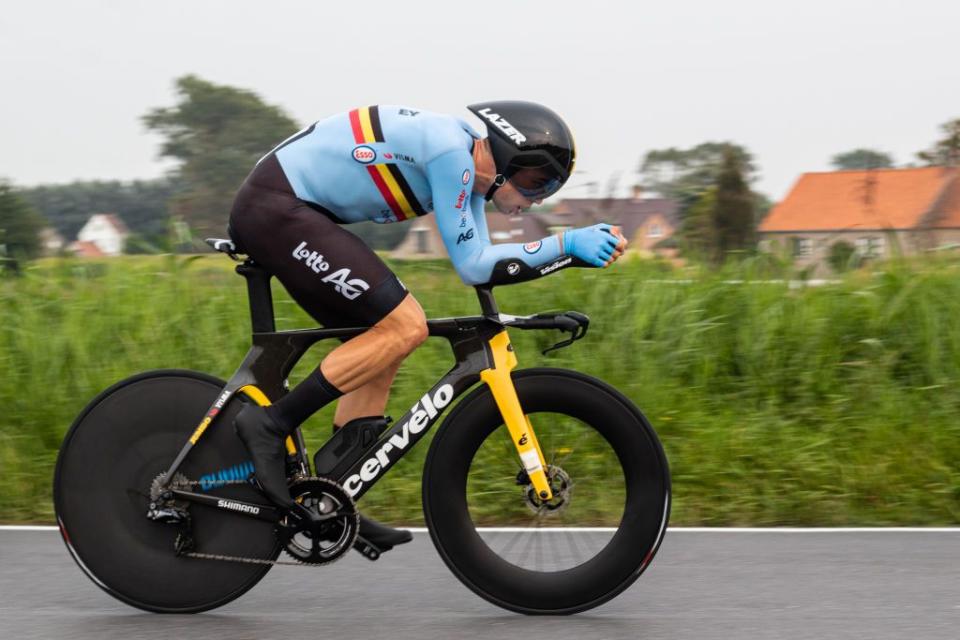This Weekend, the UCI Road World Championships Will Take Place in Flanders, Belgium

- Oops!Something went wrong.Please try again later.
- Oops!Something went wrong.Please try again later.
- Oops!Something went wrong.Please try again later.
- Oops!Something went wrong.Please try again later.
This year’s UCI World Road Championships are taking place in Flanders, Belgium. The events kicked off on Sunday, September 19 with the elite men’s individual time trial, won by Italy’s Filippo Ganna.
While we love a good time trial and enjoy getting to know the sport’s future stars in the Junior and U23 events, for us, the best races to watch are the elite women’s and elite road races. The women race on Saturday, September 25 and the men race on Sunday, September 26, with the winner of each event earning the right to spend the next year wearing the rainbow jersey as the world road race champion.
Here’s a rundown of everything you need to know:
The route
Each race begins in Antwerp and heads southeast toward Leuven, the town which hosts the finish. Upon arriving in Leuven, the racing should begin in earnest as each peloton begins dividing its time between one of two circuits, each jammed with several short, steep—sometimes cobbled—climbs.
Upon arriving from Antwerp, the women will first cover 1.5 laps of what’s being called the “Leuven Circuit,” a shorter loop that mainly stays within the city limits, then one lap of the “Flandrien Circuit,” a longer loop that takes race southwest toward Overijse, where the riders will find the race’s hardest climbs. The race then heads back up to Leuven, where 2.5 more laps of the “Leuven Circuit” will conclude the race. Overall, the women will cover 157.7 km and 20 climbs. (Click here to see the map of the full route.)
The men’s event follows the same basic formula, but covers more laps of each circuit: 1.5 laps of the “Leuven Circuit,” one lap of the “Flandrien Circuit,” four laps of the “Leuven Circuit,” one more lap of the “Flandrien Circuit,” and then 2.5 laps of the “Leuven Circuit” for a grand total of 268.3 km and—this isn’t a typo—42 climbs. (Click here to see the map of the full route.)
Both races remind us of two of spring’s Ardennes Classic: the Brabantse Pijl, which is raced on some of the same roads and climbs; and the Amstel Gold Race, a long race that also features lots of short, punchy climbs. Riders who traditionally excel in those races should do quite well this weekend.
How to watch the races
If you signed up with FloBikes ($150/year or $12.50/month) during the Spring Classics and never canceled your subscription, you’re in luck: it’s the only legal way to stream the race in the USA and Canada. Both the men’s and women’s events will be available live and on-demand via FloBikes.com, the FloSports IOS app, and the FloSports app for Amazon FireTV, Roku, and Apple TV. The FloBikes team will also be providing lots of behind-the-scenes footage and interviews with key riders.
The women’s event starts at 6:35 a.m. ET. Tune in while you make breakfast, lay out your kit for a Saturday afternoon ride, or—if you’ve downloaded the FloSports app on your phone—during your kid’s Saturday morning soccer practice. The race is expected to finish around 10:45 a.m. ET, with the last 60 to 90 minutes expected to be the most exciting.
Sunday’s men’s race begins at 4:40 a.m. ET and should last until about 11:00 a.m. ET. We’ll probably turn it on around 9 a.m. ET to catch the men tackle their second and final lap of the “Flandrien Circuit,” then the 2.5 laps of the “Leuven Circuit” to conclude the race.
What happened last year
Originally scheduled to take place in Martigny, Switzerland, the races were moved to Imola, Italy due to COVID-19. Two days after she won the women’s individual time trial, the Netherlands’ Anna van der Breggen won the women’s road race, attacking 40 km from the finish to become the first rider to win both titles since France’s Jeannie Longo did it in 1995. Van der Breggen’s compatriot, Annemiek van Vleuten finished second, and Italy’s Elisa Longo Borghini finished third.
In the men’s race, France’s Julian Alaphilippe attacked on the final climb and held-off a select chasing group including Belgium’s Wout van Aert, Switzerland’s Marc Hirschi, and Slovenia’s Primož Roglič. Van Aert finished second to take his second silver medal of the long weekend (he also finished second in the ITT) and Hirschi finished third, capping-off a fantastic summer in which he took a stage at the Tour de France, won Flèche Wallonne, and finished second in Liège–Bastogne–Liège.
Riders to watch

Annemiek van Vleuten (the Netherlands) — Van der Breggen, the reigning world champ, is expected to take the line for the Netherlands in what should be her last race before retirement, but she will likely ride on behalf of van Vleuten, who won the world title in 2019. Winner of the recent Cerazit Challenge by La Vuelta, the 38-year-old is the top contender—as she is in just about any race she enters.
Elisa Longo Borghini (Italy) — Third last year, Longo Borghini is a one-day specialist who’s won prestigious classics like Strade Bianche, the Trofeo Alfredo Binda (twice), and the Tour of Flanders. If a non-Dutch rider wins the race, don’t be surprised if it’s her.
Katarzyna Niewiadoma (Poland) — If it weren’t for the unlucky fact that her career coincided with the careers of van der Breggen, van Vleuten, and Marianne Vos, Niewiadoma would probably have won just about every race on the women’s calendar by now. Instead, she’s often forced to settle for podium spots and top-five finishes, a trend she’d love to reverse in Flanders.
Ellen van Dijk (the Netherlands) — Van Dijk would be the team captain of just about any other nation, but being Dutch, she’s just one of the squad’s many cards to play. Winner of Monday’s world individual time trial championship and the recent European road race championship, she could capitalize on her team’s incredible depth if rival teams focus too much of their attention on van Vleuten.

Wout van Aert (Belgium) — After finishing second in Sunday’s time trial, van Aert’s now won three silver medals in the last two years. Coupled with a silver medal in the Olympic Road Race, it’s safe to say that the Belgian is riding with a chip on his shoulder. Perhaps the most talented rider in the sport, the only knock against him is the fact that everyone considers him the favorite, so he’ll have few riders willing to cooperate with him or his Belgian teammates. Winner of the Amstel Gold Race in April, he’s perfectly suited for a course like this one.
Julian Alaphilippe (France) — The defending champion is once again one of the race’s top favorites, and he might benefit from the fact that all eyes will be on van Aert. With a talented team behind him including Florian Sénéchal and Christophe Laporte—both riders who could pull-off an upset if allowed to escape late in the race. Alaphilippe’s got everything he needs to become the first repeat world champion since Slovakia’s Peter Sagan won three consecutive titles from 2015 through 2017.
Mathieu van der Poel (the Netherlands) — After crashing out of the Olympic mountain bike event, there’s been a bit of question mark surrounding the Dutch superstar. But he finally returned at the Antwerp Port Epic two weeks ago—and won the race in dominant fashion. Even with only three races under his belt since the Olympics, he’s a top favorite on a course that’s perfect for him.
Tadej Pogačar (Slovenia) — The two-time defending Tour de France champion has had a quiet return after taking some time off following the Olympics. Still, both he and compatriot Primož Roglič (who just won the Tour of Spain) are contenders on a course that they probably wish were a tad harder—like the course of Liège–Bastogne–Liège, which the riders won this year and last year, respectively.
Sonny Colbrelli (Italy) — Colbrelli’s the perfect dark horse. Winner of the recent European Championship, he followed up that success with a win in the Memorial Marco Pantani. He’s in form, rides well in Flanders, and is a former winner of the Brabantse Pijl. Colbrelli’s the perfect type of rider to upset the race’s big favorites.
Tom Pidcock (Great Britain) — Winner of this year’s Brabantse Pijl and the runner-up to van Aert in the Amstel Gold Race, Pidcock is another rider to watch. He’s young, though, and has raced a long season that recently included the Tour of Spain, his first grand tour. He and Ethan Hayter will lead a deep and talented British squad, with both riders hoping to earn the nation its first rainbow jersey since Mark Cavendish won the world title in 2011.
Remco Evenepoel (Belgium) — If it weren’t for van Aert, Evenpoel would likely be Belgium’s team captain. Instead he’ll be given more of a free role, which he could capitalize on if teams let him escape while focusing too much attention on his teammate.
You Might Also Like

